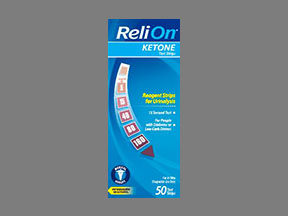
Relion Ketone Test Coupons & Savings Card – Discount Prices from $8.93
Our Relion Ketone Test coupons are free to use. You can print the coupon, email it to yourself, or receive the Relion Ketone Test coupon via text message. To get your free discount, show the pharmacist your Relion Ketone Test savings card which has the discounted coupon price. Use our filters below to edit the prescription box to match your needs. The Relion Ketone Test prices will update based on your prescription needs. Above our Relion Ketone Test coupons, you can change the location to see pharmacy prices in other areas. Our prescription discount card will update online with the specific pharmacy costs associated with your edits. Be sure to text, email, or print the Relion Ketone Test savings card code that you need after editing the prescription box and location field. Show the discount card to your pharmacist before paying.
My prescription
Edit
1, Relion Ketone Test (50 Strips)
Select pharmacy

Albertsons
$8.93
COUPON PRICE
Walgreens
$8.93
COUPON PRICERelion Ketone Test savings card
Show this card to your pharmacist
Albertsons
$8.93
BIN
ID
PCN
GRP
011867
LHA2DB6F38
HT
LABH001
Powered by
Our Relion Ketone Test coupons are free to use. You can print the coupon, email it to yourself, or receive the Relion Ketone Test coupon via text message. To get your free discount, show the pharmacist your Relion Ketone Test savings card which has the discounted coupon price. Use our filters below to edit the prescription box to match your needs. The Relion Ketone Test prices will update based on your prescription needs. Above our Relion Ketone Test coupons, you can change the location to see pharmacy prices in other areas. Our prescription discount card will update online with the specific pharmacy costs associated with your edits. Be sure to text, email, or print the Relion Ketone Test savings card code that you need after editing the prescription box and location field. Show the discount card to your pharmacist before paying.
Relion Ketone Test FAQs
Using the SaveHealth discount card, what is the price of Relion Ketone Test without insurance?
Using the SaveHealth discount card, the price of Relion Ketone Test without insurance is $8.93.
What is the price of Relion Ketone Test at Walgreens?
The price of Relion Ketone Test at Walgreens is $8.93.
